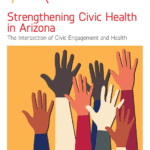Strengthening Civic Health in Arizona

The Intersection of Civic Engagement and Health
Democratic processes that are inclusive and robust are vital to creating the opportunity for everyone to be healthy. In this Spark Report, see how a community’s “civic health” matters for Arizona.
In 1995, in Chicago, a record-setting heat wave resulted in a dramatic increase in heat-related deaths. Research into the deaths concluded that social isolation was one of the leading factors.1 This study is now complemented by a growing body of literature documenting the impact of social connectedness on health.
Vitalyst Health Foundation took a closer look at this concept in an article titled “Connect for What? Social Capital and Health” published in 2011. This analysis from the Arizona Health Survey “found evidence for the importance of neighborhood social cohesion on self-reported health and well-being.”
Social cohesion is the trusting network of relationships and shared values and norms of residents in a community that allow members to achieve shared well-being.
Vitalyst is among the health funders investing in these efforts to grow community connections and long-term active community participation. Increasingly, health funders see this community connectedness and civic engagement as a social determinant of health.
This “civic health” work often calls for systemic reform to strengthen conditions so everyone can participate in the processes of building their communities. This includes establishing inclusive and robust democratic processes, which shape health outcomes and increase the opportunity for everyone to be healthy.
Read the full report here.